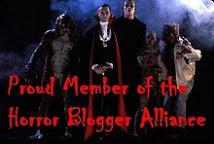(2010, Dir. by Christopher Smith.)
Black Death is the fourth horror feature by young British director Christopher Smith and I feel safe saying that the film further cements him as one of the great new voices in horror. Since his debut feature (2004's Creep), each of his films have shown dramatic technical improvements, and Black Death certainly feels like the first film Smith has made whose scope necessitates the big screen experience. Though Black Death might be a little less intriguing than his last film (the psychological time-bender Triangle), it feels like another positive step in his path as a horror filmmaker.
The film is set in the year 1348, as the titular plague is ravaging the English countryside. Sean Bean stars as the heroic knight Ulric, who enlists the help of a young monk named Osmund (Eddie Redmayne) in his quest to investigate a distant village that seems to be immune to the plague. Rumors abound that the good fortune of these villagers is the result of a "necromancer" who can bring the dead back to life, and the knight is determined to find out what, in the name of Heaven or Hell, is going on.
The young monk sets out with Ulric and his men, without letting on that his hidden purpose is to find his young lover. Most of the men are curious about Osmund, whose past seclusion has made him a bit naive for the plague-ridden countryside, and much of the film is focused on introducing him to the dangers around him as Ulric and company advance across the land. Osmund's faith shines through despite the troubles along the way, but once the group reaches the village and meets the witch in charge (Clarice van Houten) things get messy.
As the supernatural and religious aspects of the film pick up during the third act, the tension of the film multiplies drastically. While the first hour of the film builds the characters and is of historical interest, there's little drama to be had aside from the constant questioning of Osmund's purpose and faith. The men do run into enough action to keep the viewer alert during their journey, but all of that pales in comparison to the events that occur after they meet the necromancer. As methods of torture meet religious fanaticism, Black Death suddenly became a film that I found kind of fantastic.
I won't even consider spoiling the events of the final act, but I found the steps Dario Poloni's screenplay took haunting on different levels. While other recent slow-burn horror films have built up to one traumatic event - and Black Death's last brutal torture scene is certainly an attempt at a knockout punch - Smith's film instead left me more interested in the questions about what has occurred and what it means for the characters and their God.
As the end credits rolled, I found myself blankly staring at the screen and pondering what Black Death really meant for Ulric, Osmund, and the other characters we met. Were their efforts futile, or did they serve a greater calling? I'm not sure if there's an answer that's supposed to be found in the film, but I'm glad Smith and Poloni got the chance to get me thinking about it. The film's willingness to raise questions while presenting its historical tale certainly left me thinking that Black Death is a unique and well-made modern horror film, and as a result I recommend it without reservation.
Dirty Pillows For All
2 days ago











2 comments:
Thank you, this has been on my radar for a bit and I really want to see it. I'd like to see this and corman's Masque of the Red Death and compare the thoughts from both films.
Lazarus Lupin
http://strangespanner.blogspot.com/
art and review
This film is incredible. A shame that crap like Season of the Witch gets a wide release while this film doesn't.
Post a Comment